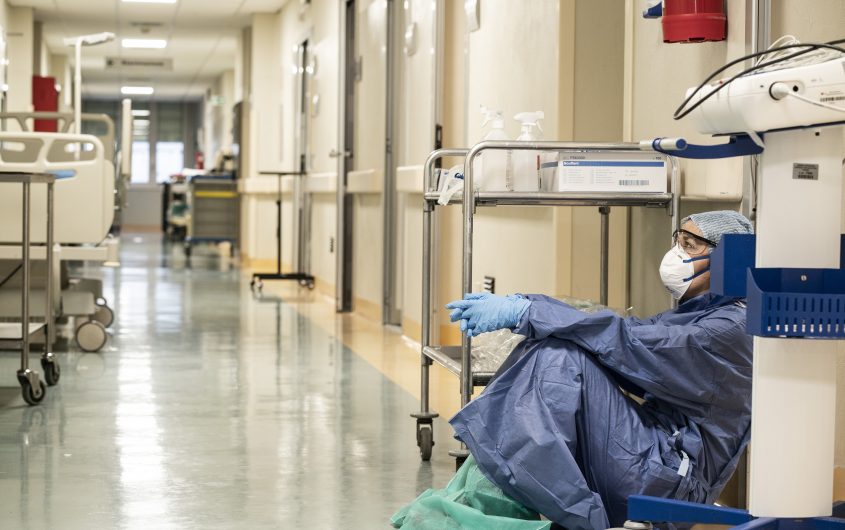
Alberto Giuliani via Wikimedia Commons
Health Care after the COVID-19 Pandemic
Lessons from Germany and the United States
The COVID-19 pandemic has highlighted already-existing vulnerabilities in the German and American health care systems. In particular, both countries have experienced workforce shortages, particularly for nurses. These shortages are linked to another issues: the lack of digitization and inefficient use of already-existing health data. In this webinar, experts from the United States and Germany will discuss the current state of the pandemic, strengths and weaknesses of both systems in providing care during the COVID crisis, and what transatlantic coalitions can be built for future reform.
with
Christine Arentz, Professor for (Health) Economics, Institute for Insurance Studies (ivwKöln), University of Applied Sciences Cologne
Rebecca Emeny, Research Scientist and Teaching Faculty, The Dartmouth Institute of Health Policy and Clinical Practice
Ines Läufer, Consultant, Association of Municipalities in North Rhine-Westphalia
This webinar will convene via Zoom. Contact Ms. Elizabeth Hotary at ehotary@aicgs.org with any questions.
Christine Arentz is a Professor for (Health) Economics at the Institute for Insurance Studies (ivwKöln) at TH Köln – University of Applied Sciences (Cologne, Germany).
Her professional experience includes four years of working as a Senior Economist and Project Manager at the Scientific Institute of the Private Health Insurance (WIP) in Cologne, Germany, where she managed research projects in International Health Care System Comparisons, (German) Health Policy and Long-term Care.
She holds a PhD in Economics and completed her thesis at the Institute of Economic Policy at the University of Cologne (Germany), where she worked as a researcher, lecturer, and policy advisor. In the earlier stages of her career, she worked as a credit analyst in international real estate, as well as a research assistant both at the United Nations Economic Commission for Europe (UNECE) and the German Central Bank.
Rebecca Emeny, PhD, MPH, is a Research Scientist and Teaching Faculty at The Dartmouth Institute of Health Policy and Clinical Practice. Rebecca received her undergraduate degree in Science, Technology and Society from Cornell University and her graduate degree in biomedical science from the University of New Mexico School of Medicine. She is a translational researcher with doctoral and post-doctoral training in microbiology/immunology and molecular epidemiology with expertise in neuroimmune mechanisms of chronic disease, resilience, and wellbeing in aging.
Dr. Emeny received her Master of Public Health at the Ludwig Maximilians University (LMU) in Munich, Germany and worked as the deputy director of the mental health working group of the Institute of Epidemiology of the Helmholtz Zentrum Muenchen from 2009-2015. Over her career, Rebecca has transitioned from experimental to observational studies in order to understand underlying mechanisms of chronic, non-communicable disease. Dr. Emeny is committed to applying this knowledge in patient and community centered research that enhances individual and population resiliency in order to improve public health and sustainable global health equity.
Ines Läufer works as a systemic organizational consultant, specializing in the public sector. Starting in October 2021, she will work as in-house consultant for the association of municipalities in North Rhine-Westphalia.
She holds a PhD in economics and completed her dissertation at the Institute for Economic Policy at the University of Cologne, where she worked as a researcher, lecturer and policy advisor.
In 2013, she spent three months as a fellow at AGI, where she conducted research on “Accessibility and Efficiency of Private Health Insurance in the United States and Germany.”
After completing her PhD, she worked as an economist at the German Federal Ministry of Health for nearly three years before turning her attention to organizational change and workplace cultures in the public sector as a key issue of good policy.
This event is part of the AGI project “The Importance of the Transatlantic Partnership in Times of Global Crises” and is generously funded by the Transatlantic Program of the Federal Republic of Germany, funded by the European Recovery Program (ERP) of the Federal Ministry for Economic Affairs and Climate Action (BMWK).







